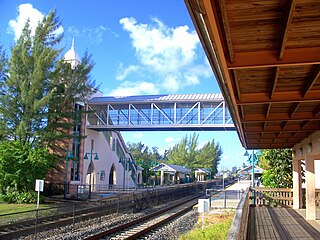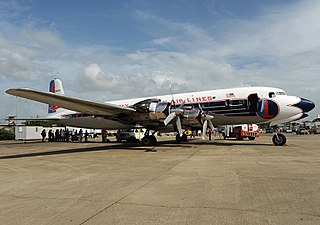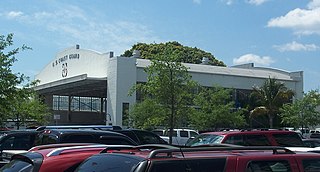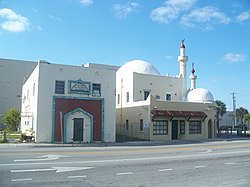
Opa-locka is a city located in Miami-Dade County, Florida, United States. As of the 2010 U.S. Census, the population was 15,219. The city was developed by Glenn Curtiss. Developed based on a One Thousand and One Nights theme, Opa-locka has the largest collection of Moorish Revival architecture in the Western Hemisphere, and streets with such names as Sabur Lane, Sultan Avenue, Ali Baba Avenue, Perviz Avenue, and Sesame Street. Opa-locka has an area of 4.2 square miles and is located in the northeastern area of Miami-Dade County, Florida.

Opa-locka station is a Tri-Rail commuter rail station in Opa-locka, Florida. Parking is available at this station, which is located near the intersection of Ali Baba Avenue and Sharazad Boulevard. The current station opened for service in 1996 directly adjacent to the former Opa-locka Seaboard Air Line Railway Station.
State Road 924 is a 8.5 miles (13.7 km) east–west highway connecting Interstate 75 and the Palmetto Expressway in Hialeah and SR 909 in North Miami. The westernmost 4.85 miles, named the Gratigny Parkway, is a limited access all-electronic toll road maintained by the Miami-Dade Expressway Authority ; the easternmost 3.6 miles (5.8 km) is a surface street also known as Gratigny Road. Despite its relatively short length, SR 924 is a major east–west artery in northern Miami-Dade County.

Miami-Opa Locka Executive Airport is in Miami-Dade County, Florida 11 mi (18 km) north of downtown Miami. Part of the airport is in the city limits of Opa-locka. The National Plan of Integrated Airport Systems for 2011–2015 called it a general aviation reliever airport.
State Road 916, locally known as Northwest 138th Street, West 84th Street, North 135th Street, Opa-locka Boulevard, and Natural Bridge Road is a 10.253 miles (16.501 km) long east–west highway crossing northern Miami-Dade County, Florida. Its western terminus is at an interchange with Interstate 75, the Palmetto Expressway, and the Gratigny Parkway on the boundary between Hialeah and Miami Lakes, traveling east to Biscayne Boulevard.

The Opa-locka Bank is a historic bank in Opa-locka, Florida. It is located at 940 Caliph Street. On May 19, 1983, it was added to the U.S. National Register of Historic Places.

The Glenn H. Curtiss Mansion and Gardens is a historic home located at 500 Deer Run in Miami Springs, Florida and open to the public as an event space or for private tours by prior arrangement.

The Opa-locka Company administration building is a historic site in Opa-locka, Florida. It is located at 777 Sharazad Boulevard. On March 22, 1982, it was added to the U.S. National Register of Historic Places.

The Opa-locka Thematic Resource Area is a group of thematically-related historic sites in Opa-locka, Miami-Dade County, Florida, United States. The area comprises 20 surviving Moorish Revival buildings which are listed on the National Register of Historic Places. The buildings were designed in the mid-1920s by architect Bernhardt E. Muller as part of the development of Opa-locka by Glenn Hammond Curtiss, an aviation pioneer, and his development and sales company, Opa-locka Company. In developing Opa-locka, Curtiss sought to follow a theme inspired by the Arabian Nights. The designated buildings include the Opa-locka Company administration building, considered the anchor of the Opa-locka development, the Opa-locka railroad station, and the development's first commercial building, the Harry Hurt Building.
Administration Building may refer to:

Opa-locka West Airport was a county-owned public airport located 12 miles (19 km) northwest of the central business district of Miami, a city in Miami-Dade County, Florida, United States. It covered an area of 420 acres (170 ha) which contained two asphalt paved runways: 9/27 measuring 3,000 x 60 ft and 18/36 measuring 3,000 x 60 ft.
The Philadelphia Register of Historic Places (PRHP) is a register of historic places by the Philadelphia Historical Commission. Buildings, structures, sites, objects, interiors and districts can be added to the list.
Baird House may refer to:
This is a list of the 58 Multiple Property Submissions on the National Register of Historic Places in Florida. They contain approximately 400 individual listings of the more than 1,500 on the National Register for the state.

Coast Guard Air Station Miami is an Air Station of the United States Coast Guard located at Opa-locka Executive Airport in Opa-locka, Florida. The station operates the HC-144 Ocean Sentry maritime patrol aircraft and the MH-65 Dolphin helicopter.
Bernhardt Emil Muller, usually known as Bernhardt E. Muller, was an American architect who worked chiefly in Florida, where he designed many buildings in the 1920s and 1930s that have been listed on the National Register of Historic Places.

N836D is a former Eastern Air Lines Douglas DC-7B restored to flying condition and previously operated from Miami-Opa Locka Executive Airport, in Opa-locka, Florida. The aircraft's airworthiness certificate expired in June 2013 and it remains at Charlotte Douglas International Airport on static display.
Curtiss & Bright were developers in the Florida cities of Hialeah, Miami Springs and Opa-locka.

Coast Guard Air Station Dinner Key is a former United States Coast Guard facility located in Dinner Key, Miami, Florida. It was built next to the International Pan American Airport.

The Crouse House, in Opa-Locka, Florida, was designed by architect Bernhardt E. Muller for owners J. W. and Jennie Crouse. The house includes Moorish Revival elements, and it was constructed in 1926 at the corner of Peri and Ahmed Streets in Opa-locka. The house is part of the Opa-locka Thematic Resource Area, and it was listed on the National Register of Historic Places August 17, 1987. Original features of the house included a bell tower at the Peri St. entrance and a dome above the garage entrance on Ahmad St., but neither feature survived numerous alterations.
Opa-locka Community Development Corp.















